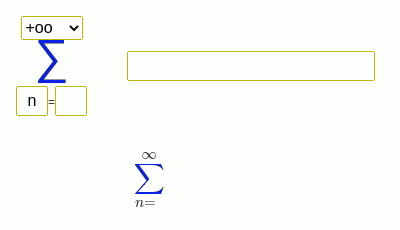Sum of series (sinx*sinx)/(x^2+1)
The solution
You have entered
[src]
oo ____ \ ` \ sin(x)*sin(x) \ ------------- / 2 / x + 1 /___, n = 1
Sum((sin(x)*sin(x))/(x^2 + 1), (n, 1, oo))
The radius of convergence of the power series
Given number:
It is a series of species
- power series.
The radius of convergence of a power series can be calculated by the formula:
In this case
and
,
,
then
Let's take the limit
we find
It is a series of species
- power series.
The radius of convergence of a power series can be calculated by the formula:
In this case
and
,
,
then
Let's take the limit
we find
True
False

Examples of finding the sum of a series
- The Sum of the Power Series
x^n/n
(x-1)^n
- Factorial
1/2^(n!)
n^2/n!
x^n/n!
k!/(n!*(n+k)!)
- Flint Hills Series
csc(n)^2/n^3
- Basel problem
1/n^2
1/n^4
1/n^6
- Harmonic series
1/n
- Grandi's series
(-1)^n
- Alternating series
(-1)^(n + 1)/n
(n + 2)*(-1)^(n - 1)
(3*n - 1)/(-5)^n
(-1)^(n - 1)*n/(6*n - 5)
- Newton–Mercator series
(-1)^(n + 1)/n*x^n
- Exam the series for convergence
(3*n - 1)/(-5)^n

 (3-sin*n)/n-lnn
(3-sin*n)/n-lnn
 (7^n+3^n)/21^n
(7^n+3^n)/21^n
 log(1+1/n)-log(1+1/(n+1))
log(1+1/n)-log(1+1/(n+1))